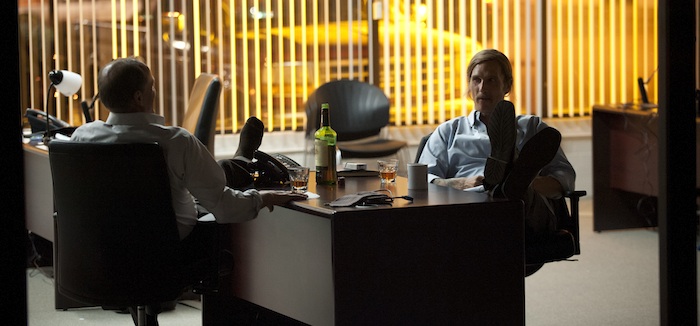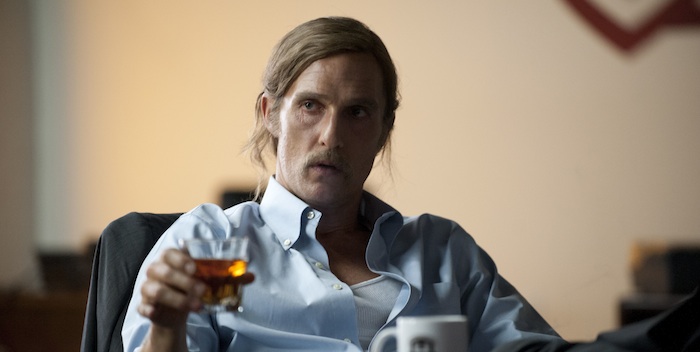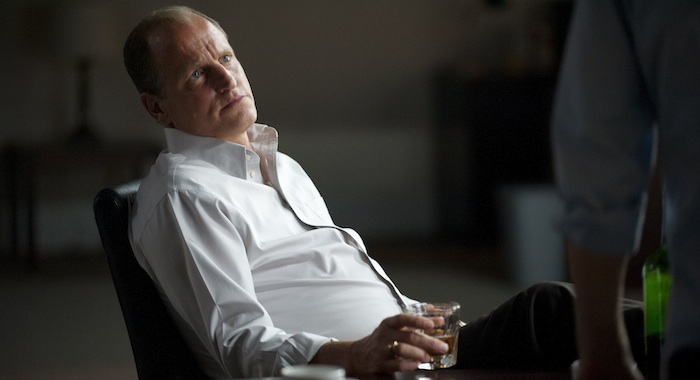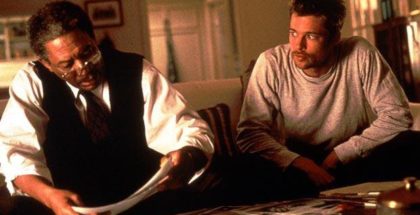UK TV review: True Detective – Season 1, Episode 8 (spoilers)
Review Overview
Plot
8Character
10Resolution
10David Farnor | On 13, Apr 2014
This review contains major spoilers.
“Ernest Hemingway once wrote, ‘The world is a fine place and worth fighting for.’ I agree with the second part.”
That’s how Se7en signed off all those years ago. A searing exploration of the dark corridors of humanity steeped in religious fervour and pre-Millennial dread, David Fincher’s thriller was nothing short of a masterpiece. True Detective bears many similarities to that 1995 movie – not just in terms of Cary Fukunaga’s cinematic visuals, the disturbing subject matter or the twisted (in all senses of the word) narrative, but in terms of sheer quality. Season 1’s finale, Form and Void, cements the show as a near-flawless piece of television.
Rust Cohle and Martin Hart have repeatedly reminded of Morgan Freeman and Brad Pitt’s partnership – the brilliant premise of Nic Pizzolato’s script being that the unbalanced Rust, all sunken face and prophetic hallucinations, is the Morgan Freeman character. He’s the sane one of the pair, the calm before the storm of Marty’s pent-up male rage.
That warped wisdom comes to the fore in Episode 8 once again. After weeks of piecing together forgotten leads and family lines, our boys in blue have traced the murders along the bayou to the house of Errol Childress (a super-creepy Glenn Fleshler). You might think, then, that we’re about to get the conclusion we’ve been crying out for: an answer, once and for all, to the Yellow King mystery. Instead, we get more philosophising from the eloquently morbid Rust.
“As sentient meat, however illusory our identities are, we craft those identities by making value judgments,” he lectures as they drive along. “Everybody judges, all the time.” Martin looks quizzically at his deranged sidekick. “Scented meat?”
That relationship – often funny, sometimes threatening, always fascinating – has defined True Detective more than anything. It’s a show about these two people, surrounded by the sick society of Louisiana. The actual story is almost irrelevant: how they react to it is what matters.
It should perhaps comes as no surprise, then, that the final episode of True Detective doesn’t quite give us that shock reveal: the twist that does occur isn’t to do with the crime, but character.
Errol, it turns out, is one of many bastard sons of Reverend Tuttle. That sense of inherited sickness, poisoning the frayed civilisation of Louisiana, seeps all the way through Errol’s isolated house, a building full of dust, barking dogs, an obedient wife and – in the shed outside – the body of his father, tied up and (possibly?) alive. While Errol is the end point of their case, though, he’s not the full story.
That lack of closure will bug some fans. But the show makes that uncertainty part of its very nature: even the cops are annoyed at their failure to find a final resolution. “We ain’t gonna get them all,” a practical Marty tells the frustrated Rust. “That ain’t the kind of world it is.”
He’s right: that ain’t. This is the kind of world where men brutally butcher women. Where people linked to shady cults fervently believe death is not the end. The kind of world where authorities cover up secrets. Where the seed of evil is sown up and down the highway.
The kind of world that Rust doesn’t want to be a part of.
They descend into the epicentre of this hellish universe as they hunt through Carcosa for Errol. “Where is he?” they ask his wife. “All around us,” she hisses. “Before you were born. After you die.”
Rust goes it alone through the tunnels, a sequence that Fukunaga milks for maximum tension with close-up handicaps and slow tracking shots. T Bone Burnett’s music, more than ever, perfectly weaves into that apocalyptic atmosphere, building to another of Rust’s visions – a mesmerising piece of CGI that’s cut short (literally) by Errol.
A couple of convenient quick shots later and Rust and Marty are cradling each other, as helicopters fly overhead looking for their bleeding bodies.
It’s that kind of one-two punch that Pizzolato has pulled so well during these eight literary chapters (another quality inherited from Fincher’s Dante-infused film) – simultaneously subverting and sticking to the genre formula. There’s more than a whiff of Kiss Kiss, Bang Bang about the hospital catch-ups that follow, but where you could cry cliché, Pizzolato leaves you exhaling with unexpected emotion.
“I’m not supposed to be here,” mutters McConaughey, wallowing in his mortality more than ever. Marty, meanwhile, breaks down completely in front of his family; a rare moment of weakness from Harrelson’s strutting male.
Hart’s saving of Rust, though, solidifies the patchy truce made earlier between the two colleagues; a turning point for their friendship, not to mention Cohle’s existential discontent.
It takes us right back to Se7en, the climax of which hinged upon the bond between its two lead men. Where Andrew Kevin Walker’s screenplay left one facing the world alone, though, True Detective leaves the team working together – a positive note among the moral disenchantment.
So what about this Yellow King? The enigmatic moniker is a reference to The King in Yellow, a forbidden (fictional) play in a string of 19th Century short stories by Robert W. Chambers. In Chambers’ stories, the play induces despair or madness in all those who encounter it. With neither McConaughey nor Harrelson returning for the next instalment in Fukunaga’s mini-series, will True Detective Season 2 see more men come across this figure and suffer the same despair that plagued Rust?
If so, the finale delivers a sliver of hope for whoever the protagonists turn out to be. Going beyond the pale for a brief moment, Rust’s glimpse of the afterlife isn’t the cold emptiness he has always spoken at length about: rather, the blackness is something warm, where his daughter is waiting, a form within the void. It’s no straight religious conversion for the weary detective, but it’s a revelation that nudges him out of that despair – a turn of character that comes as a bigger shock than any plot point could have. After such an intense series, it provides a satisfying pay-off that proves people-driven drama can be as gripping as any story-driven thriller.
Looking up the stars, Marty laments the darkness above them.
“Once, there was only darkness,” replies Rust. “You ask me, the light’s winning.”
The similarity with Se7en isn’t just in terms of quality. Almost one decade after the lid was lifted on the darkness of humanity, on the other side of the Millennium, True Detective wrestles with that open box.
The world is a fine place, Hemingway wrote, and worth fighting for.
It agrees with the second part.
True Detective Season 1 and 2 are available on Sky Box Sets. Don’t have Sky? You can also stream it legally on NOW, for £9.99 a month, with no contract and a 7-day free trial.
Where can I buy or rent True Detective online in the UK?
All photos: © Home Box Office, Inc. All rights reserved.





















